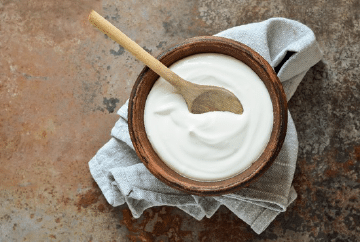The pregnancy diet: what to eat when you’re expecting
Eating well during pregnancy can also positively affect your baby’s birth weight, reduce the risk of gestational diabetes, help to manage your own pregnancy weight gain, and prepare your body to be able to breastfeed once your baby is born.
Find out what you should eat to create a good foundation for your baby’s future health and development.
Must you eat for two? 1
While it might be tempting to double your daily calorie intake and eat two of everything (like that bag of salty crisps), it’s not necessary. Most women only need around 250 extra calories a day in the second trimester, and an additional 500 in the third trimester. If you’re carrying multiples, you’ll need an extra 250 calories a day per baby. Extra calories aren’t needed in the first trimester, and try to stick to nutritious food (if the morning sickness allows), in order to keep your energy up. If you’re under- or overweight, speak to your healthcare provider as your calorie intake might be different.
Do you need supplements? 2
While most of your nutrients should ideally come from food, your body needs extra folic acid, iron, zinc, iodine, vitamin C, B vitamins, selenium and copper, so prenatal vitamins can help support you and your baby’s health.
Even before you might know you’re pregnant, folic acid helps in the formation of baby’s neural tube – the structure that develops in the first month of life, and which eventually becomes your baby’s spinal cord and brain. Together, these will form your baby’s central nervous system, which will be the control centre for your baby’s whole body, and provide the foundation for all future growth, development and normal functioning later in life.
Since there is a strong link between maternal folic acid intake and the development of the foetus’s neural tube, taking a folic acid supplement is essential during early pregnancy.
An adequate intake of folic acid has been shown to reduce the risk of neural tube defects (NTDs) including spina bifida. This condition results from the spinal column not closing properly, leaving the spinal cord exposed and potentially causing developmental problems.
Although folate is present in many foods, it’s difficult to get sufficient levels from your diet. Taking a daily supplement means you can be sure you’re getting the amount you need to support your growing baby.
A good prenatal supplement should provide sufficient vitamins and minerals you require – ask your healthcare provider for a recommendation.
What to eat?
Eating a variety of foods high in nutrients will help your baby develop and contribute to a healthy pregnancy for you. Here’s what to include in your diet:

Fruit and vegetables
Fruit and vegetables provide vitamins, minerals and fibre – try for at least five portions in total each day.
Protein3
Meat, poultry, fish, eggs, soy and beans contain protein, B vitamins and iron, which are important for you and your baby. Try get around 1g of protein per kilogram of your body weight, so for example if you weight 70kg, you should opt for 70g of protein a day.
Calcium3
Eat and drink at least four servings of dairy products and calcium-rich foods such as green leafy vegetables a day to help ensure that you’re getting 1000-1300 mg of calcium in your daily diet.
Iron3
It’s recommended to have three servings a day of iron-rich food such as lean meats (not raw), poultry, eggs, and fortified cereals.
Essential carbohydrates3
Carbohydrates such as bread and grains are a main source of energy, and some also contain nutrients such as B vitamins, iron and fibre. You can eat around six to eight portions a day.
Essential fats3
Fats are necessary for growth and your baby’s brain development. Good fats to include are monounsaturated and polyunsaturated fats, which are found in nuts, seeds, avocado and plant-based oils (including sunflower, corn, soybean and olive oil).

Some fish such as salmon, herring and trout also contain healthy omega-3s, but these should be limited to around three servings a week. Try to ensure that fat doesn’t take up more than a third of your daily diet.
How to measure portion sizes
You can use your hand to determine food portion sizes. Generally, a fist will indicate one serving of fruit, vegetable and essential carbohydrate, a palm will fit one portion of protein, while a thumb is the size of a recommended fat portion.

If you’re a vegetarian 4
Even if you don’t eat meat, chicken or fish, try to still eat all your recommended protein portions (around five a day) and iron too. It might be best to speak to a dietitian or nutritionist to ensure that you’re getting the right proteins and iron in the correct quantities. You might also want to consider supplementing with extra vitamins, but chat to your healthcare practitioner for recommendations.
Don’t forget to drink
Remember… don’t be hard on yourself!
If you aren’t able to maintain a healthy diet 100% of the time, don’t worry. If you’re sticking to good guidelines 80% of the time, then it’s okay to still indulge in your ice cream and toasted cheese cravings every now and again!
1 Eating right during pregnancy: MedlinePlus Medical Encyclopedia Consulté le 27/05/2021
2 WHO | Daily iron and folic acid supplementation during pregnancy Consulté le 27/05/2021
3 WHO | Nutrients Consulté le 27/05/2021
4 What to eat for a vegetarian pregnancy – BBC Good Food Consulté le 07/06/2021
5 WHO | Restricting caffeine intake during pregnancy Consulté le 27/05/2021
BA21-261



